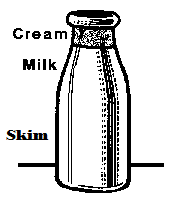
Brownies, Girl Scouts, and Why I Don’t Give To The United Way Any More


I was looking through my jewelry box tonight and I found my Girl Scout stars and badges and pins. I was a Brownie, and then a real Girl Scout, and I absolutely loved it until sixth grade, when Scout Headquarters decided to mix ages and put together all-new troops with various levels in each.
This sucked, so I quit. All the older girls quit. It meant we could no longer go bowling, because the little kids had to be watched and taught. It meant the end of our going for the badges because we were expected to help the little girls earn theirs. It meant we could no longer hang out in the Public Service kitchen downtown and cook stuff, because the little kids had to be watched and shown how to do everything. And watched.
We were being used as babysitters and we didn’t like it.
That Public Service kitchen was awesome. We had loved going there, even though our scout leader’s idea of teaching upper elementary girls to cook consisted of “how to read the instructions on a box of cake mix.” I was genuinely shocked to discover that there were girls my age who didn’t know how! I mean, seriously, how stupid could they get? Yes, I was compassionate even in my youth.
Twelve-year-old girls who had never cracked an egg. Twelve-year-old girls who didn’t know how to measure water. I was horrified. I’m still horrified.
I still have my Public Service pin, too. I’m almost afraid to ask, but does anybody else out there remember. . . . Reddy Kilowatt?
As a lovingly handled my pins, I remembered my last contact with the Girl Scouts. It was years ago, when my daughter was in lower elementary school. I taught in a small rural K-8 school, one of three middle schools in a large system, and the only one that was wayyyy out in the country, miles from any kind of business. Next door on one side was a cow pasture. On the other side was a cemetery.
There really wasn’t much of anything for the little girls to do, so I thought about becoming a Brownie leader and organizing a troop of Sara’s friends and classmates, meeting every week right there in the school so their parents wouldn’t have to drive all the way to town, and re-creating the fun experience I’d had as a Brownie, myself. We were so poor that I was cutting up my dresses to clothe my own children for school, but my time would be free. I’d been giving to the United Way for years, and they would pay for supplies, etc., right?
It didn’t happen.
I called Girl Scout Headquarters and asked how one went about doing this. The woman I spoke with was ECSTATIC that I wanted to be a Scout leader. She proceeded to tell me that my list of girls would be waiting at the office, and oh, I should find a meeting place in town because that would be central, and oh, I needed to find a business to sponsor us, and oh, when could we start selling cookies?
I had a few questions. The first one was, what list of girls? I had a list of girls, well over twenty. “NO NO,” she said. “We have a waiting list of girls. Your own daughter may join them, of course, but the rest will have to be put on another waiting list.” I could feel the pulse begin to pound in my neck.
My second question was, what do you MEAN, a business to sponsor us? I’d been giving to the United Way for years; I thought that was paying for Brownies, etc. in my community. “Well, no,” she said. “The United Way doesn’t pay for anything concerning the individual troops.”
My third question: Where is all this United Way money I’ve been donating, believing I was sponsoring scout troops, paying for craft materials, refreshments, etc, actually going, then? “It all goes to Corporate,” she replied.
My fourth question: Am I buying carpet and wall art, and paying salaries, for Corporate, with my donations? Why am I buying carpet and wall art and paying salaries for an organization that then tells its individual troops they have to solicit businesses for craft supplies and refreshments?
“Um, if you’ll give me your name and phone number, ma’am, I’ll have someone call you tonight.”
You do that.
Later that night. . . “Rinnnng.”
“I feel there has been a misunderstanding regarding your desire to be a Brownie leader?” I’m hoping, so, yes. “We already have several lists of girls who need a leader, so we’re hoping you’ll agree to do that. They’re all in town. When can you start selling cookies?”
I prefer to lead a troop out in the country, right in my classroom, immediately after school. I have a list of over twenty little girls. If your town girls want to join us, they’d be welcomed.
“I’m afraid that wouldn’t work out for the girls on our lists. They all live in town and really prefer a central meeting place. When can you start selling cookies?”
Again, I’d be happy to include some of the town girls in my troop, but I have twenty names of little girls right here already in the school building. Doing this here is part of the deal.”
“I’m afraid that isn’t possible. We already have lists of girls right there in your town. When can your new troop begin selling cookies?”
I don’t live in town. I live out in the country, fairly near the school. The little girls on my list all live out in the middle of nowhere, and after school in our building would be perfect for them, and for me. Now, please tell me about soliciting a business to pay for what I thought the United Way covered.
“I hope this won’t in any way compromise your opinion of the United Way, ma’am. The money they collect is all sent to central office; they don’t support individual local Scout troops. Local Scout troops must ask a bank or store to sponsor them.”
Then why are the Scouts on the list of local supported United Way clubs and agencies?
“Um, ma’am, why don’t I have a United Way representative call you and explain?”
Don’t bother.
A frantic woman from the United Way called me the next night, but I wasn’t interested.
I give to many local charities, agencies, and clubs, and I donate my time and skills to various agencies all the time, but I do not give to the United Way. I had never been so disillusioned in my life. I feel that all those many years of giving to the United Way was money wasted, since it didn’t go directly to children. I do it all individually now.
If anybody can explain all of this to me, I’d really love to hear it, because even though it was years ago, the memory still makes me furious. Is it still like this? Please say no.

Widdershins
Mamacita says: I have always loved fairy tales. I do not mean the insipid heavily-edited baby-tales, all with happy endings, the Disney-fied versions; I am speaking of the real thing: stories full of blood and guts and red-hot spikes and death and endings-that-are-not-always-happy and the accidental lunching on one’s infant and the horrendous consequences of not following directions or keeping oneself moral.
Mom had a large thick book of fairy tales when we were kids. One of my favorites was a tale not as popular as Cinderella, or Snow White, or Sleeping Beauty, etc. One of my favorites was the story of Burd Ellen, and her brothers.
I loved this story on so many levels. . . . but one of those levels was the vocabulary. It was full of many-syllabic wonders: words that the second and third grade world would have shortened and made politically correct in a whipstitch.
My favorite word in this story was “widdershins.” (Antonym: deosil)

Widdershins and deosil
Its meaning wasn’t explained within the story, and I liked that, too. It meant that I got to pull down the absolutely immense dictionary and look it up. And while I had the dictionary down, I got to look at the shiny slick pages of world flags, and jewels, but I digress.
I’m not going to tell you the definition, either. That’s not how I teach. By now, you should be interested enough to find out by yourself. You know, like real students do.
Widdershins. Burd Ellen was snatched up by evil elves and taken to fairyland  because she went widdershins around the church. I was lost in fascination by this word and by this concept. She and her brothers were caught up in playing and forgot the warning and she went widdershins around the church, chasing the ball.
because she went widdershins around the church. I was lost in fascination by this word and by this concept. She and her brothers were caught up in playing and forgot the warning and she went widdershins around the church, chasing the ball.
Please, take your children to the library and check out a big thick book of UNABRIDGED fairy tales. Don’t waste your time with anything that’s been edited; you want the real thing, the genuine unadulterated scary bloody real thing. Abridgments are the devil. Yes, THAT devil. Do not allow an abridged ANYTHING in your home; it will devour your soul and make your children stupid.
Some “experts” claim that scary stories traumatize children. I do not believe that. This is not to say that your five-year-old would do fine with Steven King, no, not at all. Context, y’all. But a good satisfying scary fairy tale? Go for it. I can still remember sitting with that huge book, projecting myself into the illustrations, and grooving on the musicality of the language. I can remember coming to the end of a story and closing the book, thinking satisfactorily that since the wicked stepmother is dead, she’s not OUT THERE any more, and not only is Cinderella safe from her grasping hands, but so am I!!!
Whereas the Disney stepmother was forgiven, which means she’s still OUT THERE, and no little child is safe.
The little mermaid died, too, but it was the only honorable way out for her. Once she got legs, walking was like being sliced by sharp knives, and with legs, she had to get married to get a soul or vanish completely. The very obnoxious prince she wanted was already married, so it was murder him in his bridal bed or dissolve. She dissolved. Word to Disney.

Hans Christian Anderson’s Little Mermaid
I love Disney animated movies, don’t get me wrong, but those are not the real stories. I also understand that these stories were passed from generation to generation verbally, and if you’ve ever played “Secrets” at a party, you’ll know how much even a simple sentence will change as each person whispers what they think they heard to the next person. Once written down, though, the stories started carving themselves in stone, and those are the versions I love best. I’m not saying YOU have to love them best, but I think we should understand the dark underbelly of “Happily Ever After.” I wish parents and teachers would expose children to the real thing, in print, and refuse to allow those sissy censored edited changed and WRONG WRONG WRONG books of these stories to grace the bookshelves of our schools and homes. Let the kids experience the wonder and satisfactory retributions and blood and guts and weeping and punishments and VOCABULARY of these stories, exactly as the authors and re-tellers put them down in the first place. It creates opportunities for comparison/contrast, too. Run with it.
I can close my eyes and remember those illustrations. There weren’t very many, because too many pictures in a good book is an unpleasant distraction, but those pictures that were there, were, to quote Spencer Tracy on Katherine Hepburn, “cherce.”
Widdershins. Burd Ellen. I hadn’t thought of Childe Rowland in years, but I thought of it this afternoon whilst chatting with a dear friend; he used the word “widdershins’ and I was transported back to my childhood, poring over that big thick book, fascinated by the picture of the big gothic church and the young girl chasing a ball widdershins around it, not to reappear. I remembered how much I loved it.
Widdershins and its antonym, deosil, are associated by some people with the occult, but don’t let the undereducated fears of such people influence you. Go HERE, and become enlightened at once. Do not skip the big words. That is what your dictionary is for. If you know how to use context clues, you won’t need a dictionary, even.
And contrary to what the not-very-good elementary teachers might think and say and do, small children love big words, and the best way for them to learn them is for them to hear them.
Condescension is never a good thing, and dumbing-down, editing, and changing all the cool big words into stupid tiny words is an insult to our young people.
Good People Exist & They Shall Prevail!
 Mamacita says: I tend to stress and focus here on people who are, let us euphemistically say, somewhat less than nice, or less than hardworking, or less than considerate, etc. Let’s face it: those are the people who “stand out” sometimes, which is most unfortunate since such people don’t deserve to stand out.
Mamacita says: I tend to stress and focus here on people who are, let us euphemistically say, somewhat less than nice, or less than hardworking, or less than considerate, etc. Let’s face it: those are the people who “stand out” sometimes, which is most unfortunate since such people don’t deserve to stand out.
My question is simply this: What has happened to us as a society that we give all this time and attention to such people when it’s the OTHER kind of people who are most deserving of it?
In any group of 100 people*, for example, 95 of them are good, kind, honest, decent, considerate, intelligent, polite, hard-working, savvy people. 95 out of 100 people earn a living, help others, discipline their children, read things other than the sports page, keep promises, control their hormones, appreciate, thank, accept responsibility for their own actions, and take care of their responsibilities properly and well. These people know what love is, and what love does. I shall refer to this group as the “cream.”
As for the remaining 5, who lie, cheat, steal, abandon, betray, abuse, annoy, harm, distract, neglect, attack, ignore, and defy**, and who choose themselves and their own personal convenience first, above and beyond any person or any responsibility they might have, and who consider “consequences” as some coincidental oddity that occasionally falls from the sky for no apparent reason, and just generally do their utmost to prevent others from learning, achieving, living a good life, being comfortable, feeling secure, or in any way being able to trust? These people believe that love is sex. I shall refer to this group as “skim milk,” or , the “lowest common denominator.” (LCD)
The lowest common denominator is, naturally, at the head of the line when it comes to attention-grabbing, which is one reason the media is all over them like piranha on a cow’s hind leg. The lowest common denominator is fascinating to read about, for their antics and general lifestyles are so far from what decent, intelligent people believe and do that it’s often like watching or reading about an alien species. (Hoarders. Honey Boo Boo. I rest my case.)
Which, indeed, it is. And not a superior one, either. Quite the opposite. Maybe, an evil alien species that’s trying to take over the planet in order to drain it to keep itself alive. “To Serve Man” etc.
While the lowest common denominator is out there doing its “thang,” the cream is busy taking care of people: their own, and those the lowest common denominator left behind. The cream is working two or three jobs, making sure their children and other people’s children have shoes and milk. The cream is trying desperately, with little or no support, to educate both the cream and the LCD, often amidst great reluctance at the best and chaos, destruction, and harm at the worst from the lowest common denominator. The LCD will often protest being asked to lay aside their egos and fun and body parts – instant gratification – merely for the sometimes delayed gratification of thinking, connecting, exploring, and probing their heretofore unexplored brains. That’s too hard, and besides, most of the LCD don’t have a large enough vocabulary to make very many connections. Small vocabularies are also one of the causes of much of the violence: when someone doesn’t have the means to communicate verbally, he/she tends to strike out physically.
The more words we know, the more connections we are able to make. The more connections we are able to make, the more we can understand. The more we understand, the less apt we are to be violent.
The more we understand, the more we want others to be able to understand, too.
Uneducated, undereducated, lazy, small-minded people perceive the world to be equally small, and treat it likewise. To the LCD, the world is a buffet of victims and freebies, all of which belong to him.
The cream tends to perceive the world as being just like themselves: eager to know, willing to learn, trustworthy, hardworking, and worthy of respect. Even after being victimized time and again by the lowest common denominator, the cream still has hope.
I wish the media, the business world, and the schools would stop giving the lowest common denominator so much more than their fair share of attention or focus. Making headlines out of adultery, betrayal, violence, bullying, drugs, disruptions, adultery, selfishness, etc, somehow makes such things “okay” to a person without the means to make proper connections. “Wow, it’s in the paper! Cool!” is not a good attitude to cultivate in our young people, or in our LCD older people, either.
The cream doesn’t usually make headlines. The LCD have money, and they aren’t interested in spending it to find out about cancer cures, rocket science, volunteering, sacrifice, donations, and people who go about their lives quietly, decently, doing the right thing even when the wrong thing would be easier and a lot more fun. The LCD feed on discord and personal pleasure, and lately they’ve had plenty to feast upon.
No matter how the lowest common denominator may prosper, and no matter how much attention they get from the media and the people who finance it, and no matter how much our schools ignore, neglect, and even punish the pupils and teachers who work and care above and beyond the norm, the cream will continue to work, care, love, and display those very unfashionable traits like loyalty, fidelity, ethics, citizenship, good behavior, charity, and other positive attributes laughed at, devalued, and mocked by the lowest common denominator
In the end, the cream will rise. It always does, no matter how hard the LCD tries to push it down or mix it up. The cream will continue to rise, and work, and love, and be shining examples that get no press to those fortunate enough to know them.
The lowest common denominator may get most of the attention, money, services, and press, in business, education, media, etc, but it is the cream who will ultimately rise to the top.
Let’s all give the cream the time and attention they so rightly deserve.
* I made up this statistic, but I stand by it.
**The bad, negative kind of “defy,” not the cool, out-of-the-box kind that creative people are often forced to do.
Oh, oops, is “stupid” a politically correct word? My bad. And, too bad. Used properly, it’s the perfect description for some.
Besides, overuse of political correctness and euphemisms cheapens our language, and our society.
Bring it on.






